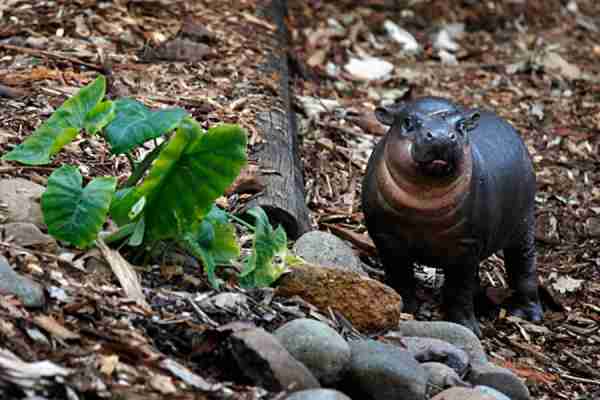The elephant and the rhinoceros are the two largest terrestrial mammals on the planet, although hippos come in third place. When Hippos reach adulthood, they will be approximately 1.5 meters tall and have a weight ranging from 1,500 to 1,800 kilos.
Table of Contents
If you go to a national park that features hippos, you will most likely see them submerged in water rather than eating. This raises the topic of what kind of food hippos consume. A hippo being the third-largest land animal would need to eat in order to survive.
This is because they eat during the nighttime. In case, if you see any hippos eating on the river bank during the day, this could be a tiny part of their overall food intake.
In this piece, we will discuss hippopotamuses’ diet, including the kind of food they consume and how they eat it.
The Essentials
- Hippos are considered semi-aquatic animals since they spend significant time submerged in water.
- Hippos are known to be aggressive and may attack anyone including humans reaching its territory.
- They are primarily herbivorous. However, it is known that they will occasionally eat meat as well.
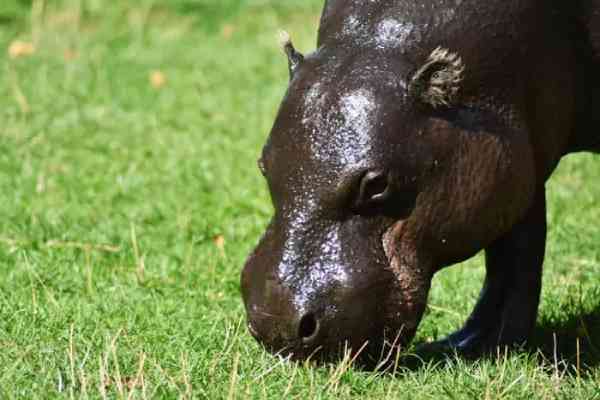
What do Hippos Eat?
Hippos eat mostly short grass as their primary food source. This is the typical type of shortgrass that can be found in savannah wildlife parks. Other herbivores such as zebras, Uganda kobs, Thomson’s gazelles, and buffaloes are able to eat the same type of shortgrass as hippos do.
While hippos are mostly herbivores, they are known to eat carrion (dead animals) occasionally. And while they mainly eat grass, they have been known to eat vegetables, fruits, and even fish on occasion. Hippos are able to stay submerged underwater for up to six minutes at a time in order to find food.
When they return to the surface, they often approach their herd mates and regurgitate some of their food for them to eat.
A hippo’s day usually starts with a large meal. During the day, hippos head out to the banks of the river or lake to graze on the grass. This is to easily come back to water when it gets too hot.
However, in the evening is when hippos go out of the water for serious feeding. They’re known to travel long distances, up to 8 kilometers, in order to find food. On average, an adult hippo can eat about 40 kilograms of grass during this nocturnal eating activity.
To eat all this grass, they use their lips to pull it and their 20-inch-long teeth to chew before swallowing. All this grazing helps them maintain their large size and weight.
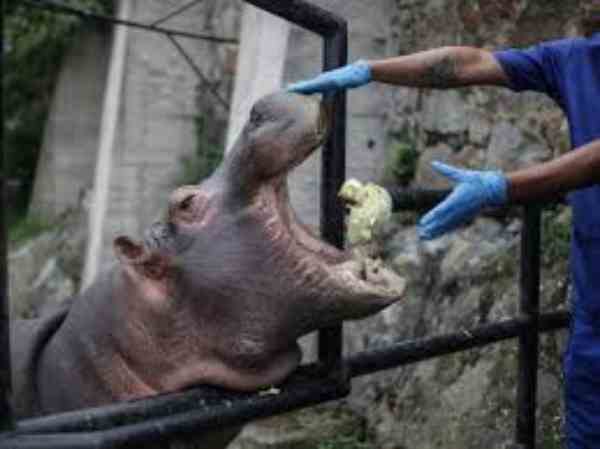
Here is a Detailed List of the Top 5 Foods That the Hippopotamus Eats.
Hippos are incredibly dependent on a relatively limited number of different dietary sources. They very infrequently consume anything that is not consistent with their typical feeding habits. It would appear that practically all hippos have access to the following five food sources:
- Grasses
- Reeds
- Shoots
- Fruits
- Meat (like Wildebeest or Zebra)
Hippos Feeding Adaptations
Because of the fact that they are so large and heavy, they have a high-calorie intake demand, which can reach up to 150 pounds each day. Hippos have longer intestines than other animals, which allows them to digest food at a slower rate so that they may satisfy their enormous appetites. Because of this, the body is given additional time to absorb all of the essential nutrients it requires.
Additionally, their stomachs are compartmented into many chambers, which enables them to store food for longer periods of time. The fact that hippos are able to go without food for several days at a time and still remain alive helps to explain why they spend so much of their time in the water. When they do eventually come out of the water, it is typically at night because they are searching for food at that time of day.
Feeding Habits of Hippo
Hippos are unique creatures that have many interesting characteristics. One of these is their feeding habits. Unlike other animals, hippos don’t just graze randomly. Instead, they follow the same path every evening in search of food. This path can extend up to 2 miles from the water’s edge.
Another interesting fact about hippos is that they prefer to eat alone rather than in groups. They likely do this to avoid having to compete with other animals for food. Hippos will leave the land and head back to the water as soon as the sun starts to set so they can mate and interact with the other group members.
Because they have no sweat glands and their skin is sensitive to the sun, hippos must feed at night when the temperatures are cooler. This helps them to avoid the harsh sun during the day and prevents their skin from drying out.
The pink fluid that they produce around their eyes and ears is another form of adaptation that they have developed. This chemical aids in keeping their skin moist while also shielding it from the damaging effects of the sun.
What About Meat? Do Hippos Eat it?
The response to this inquiry is going to be a little bit involved. Although hippos are primarily herbivorous, there is evidence that some of them will consume meat on occasion. This happens most frequently when there is a scarcity of vegetation and the hippos are compelled to seek out alternative sources of nutrition for themselves.
Also, it is important to keep in mind that meat does not play a significant role in their diet and that they will only consume it when it is absolutely necessary. In point of fact, the majority of hippos favor water plants, which account for the vast majority of the hippos’ diet.
Ph.D. student Leejiah Dorward provided an in-depth account of an observation he made of two hippos feeding on the body of a dead crocodile in an essay that was published in the African Journal of Ecology. Dorward’s article was titled “Two Hippos Feasting on the Body of a Dead Crocodile.”
It was his observation that was discussed in the report. Dr. Joseph Dudley of the University of Alaska made the finding while on a trip to Hwange National Park in Zimbabwe in 1995. This is the first time that a report of this occurrence has been independently validated.
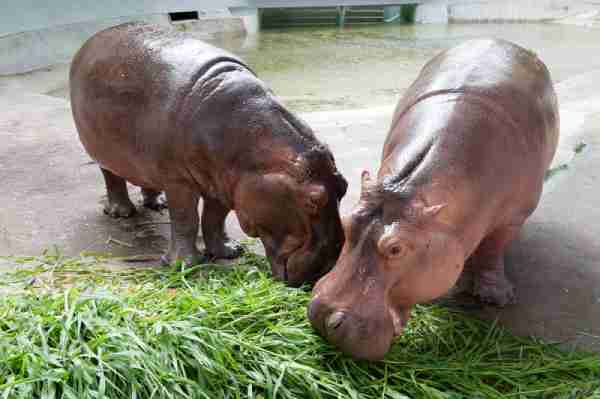
It has been established by Dr. Keith Eltringham that hippos are able to consume meat due to a lack of appropriate nutrients, particularly in situations when there are limited sources of food.
There are numerous additional instances in which it is asserted that they ruthlessly hacked away at the meat as a method of ‘killing’ the animal that had agitated them. In order to guarantee that the animal will die and that it will be cut up into many parts after its demise.
Despite these exceptions, the idea that hippos are herbivores due to their “herbivore-like” digestive systems is still generally held. You shouldn’t get your hopes up just yet about seeing a carnivorous hippo.
Because of its capacity to tear apart practically any other animal, including lions and crocodiles, the hippopotamus is regarded as the most dangerous wild animal that can be found in the African savannah. There is no question that the hippopotamus poses a greater risk than the lion does.
In the Wild, Do Hippos Eat Watermelons?
You may wonder if a hippo can eat watermelon in the wild. But they don’t, there is no watermelon available there.
It should also be noted that humans are not allowed to feed wild animals including hippos. This is because it may affect the health of animals which is not natural.
In the zoo before taking you on a safari, officers will warn you not to feed anything to the hippos or other animals including watermelons.
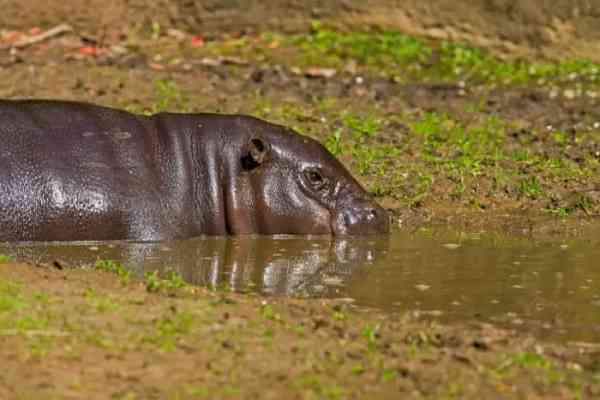
How do Hippos Feed their Young?
Hippos have babies that weigh an average of 40 kg when they are born. They have to eat a substantial amount of food every day in order to maintain such gigantic size.
Baby hippos, also known as calves, continue to consume their mother’s milk while they are still submerged in the water throughout the first few weeks of their life. They are able to accomplish this feat by plugging their eyes and nostrils as well as continuing to suckle when they are underwater.
When they are about three weeks old, calves begin to eat on grass that is closer to the surface. However, they continue to nurse for up to eight months, and while they do so, they only graze a safe distance away from their moms.
As a direct consequence of this, the eating habits of young hippos are significantly unlike those of adults.
Final Words
We hope you found all the relevant information about what hippos eat and their related habits. Hippos are not just interesting in regards to what they eat, they are so much more. They are interesting in their own right, as creatures that have managed to adapt to their environment in a way that allows them to thrive.
They are also interesting because they are one of the few animals that can be found in both the wild and in captivity. In addition, they are interesting because of the role they play in their ecosystems.
Read our other blogs below:
- What Do Bobcats Sound Like? (Various Reasons)
- Animals That Whistle (9 Whistling Animals With Pictures)
- What Animals Eat Corn? 13 Wild & Farm Species Examples (Pictures)
- 11 Animals with Manes
- Do Deer Hibernate or Migrate? [Winter Behavior Facts]
References:
https://www.livescience.com/27339-hippos.html
https://study.com/academy/lesson/what-do-hippos-eat-lesson-for-kids.html
https://www.usatoday.com/story/news/2022/09/27/what-do-hippos-eat/10303668002/
https://ielc.libguides.com/sdzg/factsheets/hippopotamus/diet
A motivated philosophy graduate and student of wildlife conservation with a deep interest in human-wildlife relationships, including wildlife communication, environmental education, and conservation anthropology. Offers strong interpersonal, research, writing, and creativity skills.

